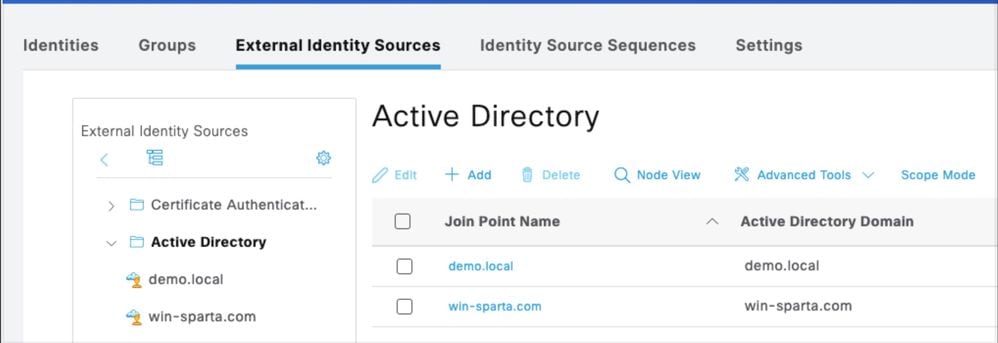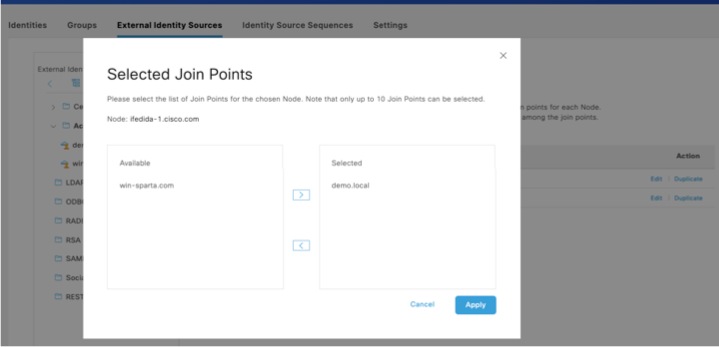Introduction
This document describes about On-Demand Resource Reservation for Active Directory on ISE 3.3 Patch 4
Pre-Requisites
Knowledge on Cisco Identity Services Engine (ISE)
Knowledge on Active Directory (AD)
Knowledge on ISE and AD Integration
Components Required
The information in this document is based on these software and hardware versions
- Cisco Identity Services Engine 3.3 Patch 4
- Microsoft Windows Active Directory 2016 or latest
The information in this document was created from the devices in a specific lab environment. All of the devices used in this document started with a cleared (default) configuration. If your network is live, ensure that you understand the potential impact of any command.
Background Information
AD Authentications are sometimes slow and eventually fail. Possible reasons could be ADID Queue starting to pile-up or All ADID Pool Threads getting exhausted.
More details on ADID:
An ADID, also known as a distinguished name (DN), is a string that uniquely identifies an object within the Active Directory directory. They are used to locate and manage objects within the Active Directory domain. ADIDs are crucial for managing user accounts, permissions, and other resources within an Active Directory environment.
A typical ADID must look like this: CN=John Doe,OU=Sales,DC=example,DC=com; where,
CN=John Doe: Represents the common name of the user, John Doe.
OU=Sales: Represents the organizational unit (OU) where the user belongs, in this case, the Sales department.
DC=example,DC=com: Represents the domain components, which is example.com.
For Example:
Refer to Picture 1: A typical AD Join Point Configuration
 Picture 1: AD Join Points
Picture 1: AD Join Points
Refer to Picture 2: A typical AD flow diagram with 2 Join Points
 Picture 2: A Typical AD Flow Diagram
Picture 2: A Typical AD Flow Diagram
Symptom
Slow Join Point under same ADID Thread Pool
Problem
- What would be the Consequences of One of the Join Points being very slow? For instance, if 15 authentications are sent to ISE at the same time for "demo.local" and "demo.local" is unusually slow, we would need to wait for the response from "demo.local" before handling the subsequent win-sparta authentication.
- What if both the Join Points share the same ADID Thread Pool under One Join Point?
Refer to Picture 3: Flow diagram of Slow Joint Point
 Picture 3: Problematic Flow
Picture 3: Problematic Flow

Note: Here, all 15 Threads are occupied by win-sparta.com at the same time leaving no thread for demo.local
Solution
- Default behavior is a Common Thread Pool for all AD join points
- However, Admins can segment each join point to have its own resources.

Note: When AD Prioritisation is applied, the default is 10 Threads per Thread Pool.
Refer to Picture 4: Flow diagram of On-Demand Reserved Joint Point
 Picture 4: Solution Flow
Picture 4: Solution Flow
Step by Step Configuration
Step1: Create 2 separate AD Join Points. Here for example we have: demo.local and win-sparta.com
Step2: Create Join Point prioritization after AD Join Point creation.
Refer to Picture 5:
 Picture 5: Join Point Prioritisation
Picture 5: Join Point Prioritisation
Step3: Under Join Point Prioritisation, select the PSN that you prefer to reserve dedicated AD resources. Click Edit.
Refer to Picture 6:
 Picture 6: Edit PSN
Picture 6: Edit PSN
Step4: Select the Preferred Join Point for the Preferred PSN.
Refer to Picture 7:
 Picture 7: Selected Join Point
Picture 7: Selected Join Point

Note: Any Join Points not included in the Prioritisation utilize the Common Thread pool, which has a maximum limit of 15 threads.
Step5: Prioritisation is Finalised
Refer to Picture 8:
 Picture 8: Prioritization config
Picture 8: Prioritization config
Additional Details

Tip: If you would like to replicate the same settings to other PSNs, you can use the Duplicate option. Select the desired PSN, and choose the Join Point to be duplicated along with the original Prioritisation.
Refer to Picture 9: Configuration Tip:
 Picture 9: Duplicate Prioritization Config
Picture 9: Duplicate Prioritization Config
Step6: Final List after Duplication
Refer to Picture 10:
 Picture 10: Final List after Prioritization
Picture 10: Final List after Prioritization
Troubleshooting
Verification
Verify the Configuration Changes. Navigate to: Operations > Reports > Audits > Change Configuration Audit
Refer to Picture 11:
 Picture 11: Config Audit Report
Picture 11: Config Audit Report
Logging
- Enable debug level for runtime-AAA logs.
- Analyse prrt-server.log
Refer to Picture 12:
 Picture 12: Debug Log Config
Picture 12: Debug Log Config
Log Snippets
prrt-server.log [DEBUG]: Default Log:
EventHandler,2024-08-23 07:16:48,135,DEBUG,0x7fecd2ccc700,Allocated default thread pool : ADIDStore to IDP : win-sparta.com_wxETlH16Pk_106
prrt-server.log [INFO]: When we set Dedicated Resources:
- ActiveDirectoryIDStore,2024-09-08 16:52:01,048,INFO ,0x7f2452ccf700,Allocated thread pool : ADThreadPool0 to IDP : win-sparta.com_wxETlH16Pk_106
- ActiveDirectoryIDStore,2024-09-08 16:57:11,258,INFO ,0x7f2452ccf700,Allocated thread pool : ADThreadPool1 to IDP : demo.local_6EcNs6UzwX_89
prrt-server.log [INFO]:
- Before we have set dedicated resources:
- EventHandler, 2024-09-02 08:45:54,673,INFO,0x7fafb793c700,Passed event to the next thread pool name=ADIDStore, queue size=1,EventDispatcher.cpp:757
- After we have set dedicated resources:
- EventHandler,2024-09-02 08:45:54,673,INFO ,0x7f4867ff9700,Passed event to the next thread pool name=ADThreadPool0, queue size=1,EventDispatcher.cpp:841
To Track Thread Pool Usage of "ADThreadPool0":
1. 0x7f57792f7700,Passed event to the next thread pool name=ADThreadPool0 (few logs back StackID:0x7f57a4f761c0)
2. 0x7f57732c7700,Stack: 0x7f57a4f761c0 Calling ActiveDirectoryIDStore: Method MethodCaller<ActiveDirectoryIDStore, PlainAuthenticateAndQueryEvent>
3. 0x7f57732c7700,cntx=0000210117,sesn=ifedida-1/515863662/5273,CPMSessionID=C0A31430000000800018958,user=abcd,CallingStationID=[CAD] 956: CAD_PAPAuthenticate (abcd) called
4. 0x7f57732c7700,cntx=0000210117,sesn=ifedida-1/515863662/5273,CPMSessionID=C0A31430000000800018958,user=abcd,CallingStationID=[CAD] 1026: CAD_PAPAuthenticate (abcd) succeeded
5. 0x7f57732c7700,Passed event to the next thread pool name=Main
FAQ
Question: How many AD Join Points can ISE support?
Answer: You can configure up to 50 Active Directory join points on a single ISE deployment.
Question: If I have multiple AD Join Points, can I still use On-Demand Prioritisation?
Answer: Yes
Question: What is the default thread size without Prioritisation for a single domain?
Answer: 15 Threads
Question: If I configure Prioritisation, how is the calculation done? Consider, a 3 Join Point scenario - domain1.com, domain2.com and domain3.com with domain1.com is not configured for Prioritisation and domain2.com and domain3.com are configured for Prioritisation.
Answer: If domain1 is not configured for Prioritisation, domain1.com utilizes the common 15 threads available - all at the same time. However, since domain2.com and domain3.com are configured with Prioritisation, they use 10 Threads each by default and not follow/utilize the common 15 Threads Pool.















 Feedback
Feedback